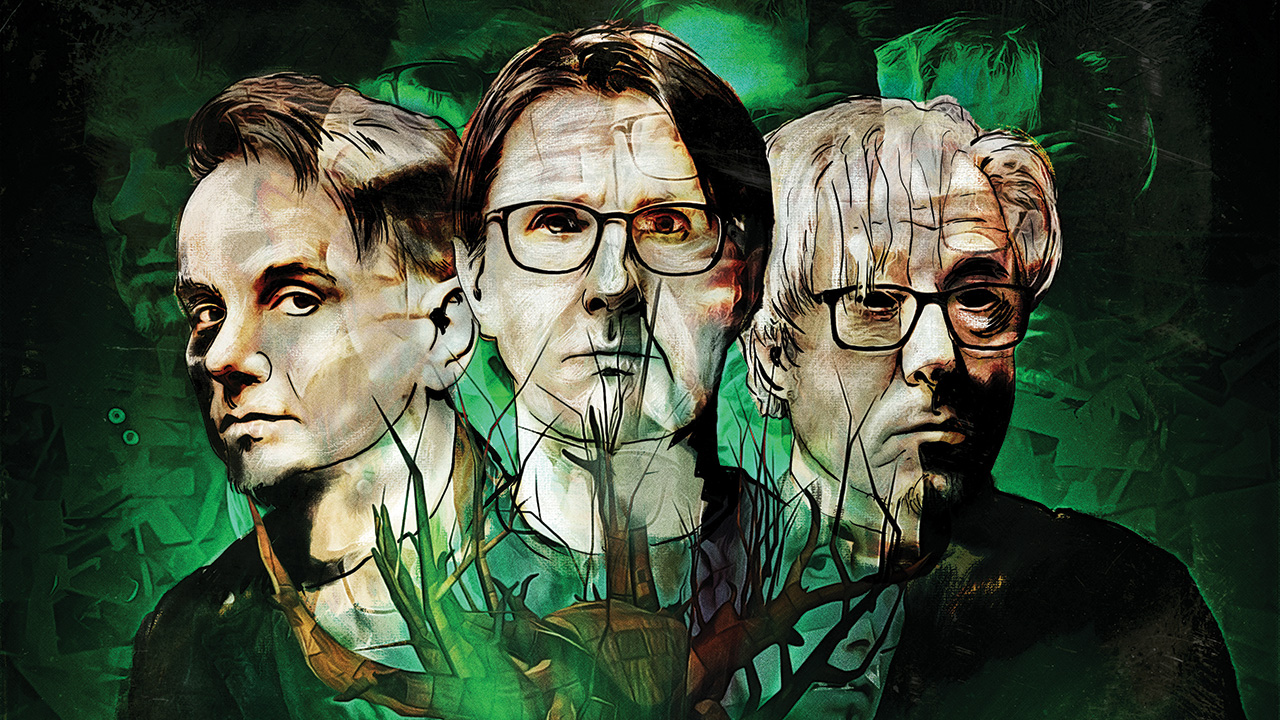You can trust Louder
In a parallel universe, Steven Wilson’s tour for his UK Top 5 album The Future Bites went ahead as planned and his fruitful solo career continued as per the script, which didn’t feature a new Porcupine Tree album. That band ostensibly shut shop in 2010 after touring their 10th album The Incident. But it turns out that Wilson, arch synth texturalist Richard Barbieri and drummer Gavin Harrison (but notably not original bassist Colin Edwin) had been quietly chipping away at new music in the intervening years. When the pandemic struck and the script changed, there was a window to finally finish Porcupine Tree’s 11th studio record.
With three such bright, seeking artists involved, Closure/Continuation was never going to be a retread of Deadwing or In Absentia. The musical DNA behind those classic PT records is here of course, but so is a renewed sense of refinement and nuance, earned by all three in the interim. Wilson’s genre-fluid catalogue speaks for itself, as do Barbieri’s own classy, thinking albums; Harrison has excelled within the resurgent King Crimson. All these experiences are in the creative mix here and, crucially, the trio have co-written more than ever before.
Opener Harridan is a case in point. A tough bass introduces the song’s main, 5/4 groove, which Harrison – simply peerless – then nails; spooky electric piano chords come in and Barbieri adds swirls of dark atmospherics. Wilson’s on impassioned form on the dour verse’s crescendo (‘You can only save yourself’) and the powerful refrain (‘When we bite the dust, We will hide our cuts from the world’). The soft breakdown and ensuing metallic riff are pure PT, but more exploratory passages flirt with the fusion of Wilson’s The Raven That Refused To Sing (And Other Stories). Right down to its enigmatic final chord, Harridan’s an adventure in sound, and Porcupine Tree are back – the same, but different.
The beautiful, fragile ballad Of The New Day is a flex of that Lazarus/Trains muscle. Set against Harrison’s subtle rhythm changes, the conventional chord progression is brought to life with some cheeky tonal diversions. Again (and importantly), Wilson’s in fine, consoling voice (‘Breathe the autumn, shame to be down in the thrall of the new day’), and then we’re taken on a crunchy detour through many different keys and time signatures, before being returned to the comfort of the verse.
Barbieri and Wilson’s Dignity is a masterful, evocative character piece/short story. The sounds of kids playing in a schoolyard echo, a jangly, riff comes in and then, to strummed acoustic, this scene-setting line: ‘Lost boy with the shreds of your shoes on your feet, and the schoolgirls called you a freak.’ Cue some spicy chords, retro synths and lyrical guitar work on an inspired piece brimming with loneliness and pathos.
And the brains come with some Crimson-style brawn. With its jagged metallic riff and subtle references to Holst’s Mars, Bringer Of War, Rats Return is a now-prescient look at the spiritual bankruptcy of tyrants and warmongers. They name names – ‘Genghis K, Pinochet, Mao Tse Tung, Kim Il-Sung’ – and given current events there’s bound to be another face on the video screens on tour this year. Herd Culling’s fiddly, prog-blues riff isn’t far from that of The Incident’s The Blind House. Tight guitar and drums are joined by fizzy electronic stabs before things get rocky (but never prog metal); Wilson’s falsetto, harmonies, throaty vocal and frantic electric guitar solo sell the drama. Written by the whole trio, this one’s controlled, beautifully balanced and oddly catchy. Predictably, the sound quality on this record is astounding.
And it wouldn’t be the Tree without some misery and alienation. Walk The Plank comes with eerie keyboard clusters, a bleak bass hook, Psycho-creepy ascending strings and claustrophobic lyrics: ‘This ship is now underwater and the rats will never find their way back again/And my span it gets shorter, And I don’t appear to fit my skin anymore.’ The album’s knotty closer, Chimera’s Wreck, opens with a gorgeous, acoustic guitar arpeggio – part John Carpenter, part Pink Floyd’s Hey You. ‘A coat of arms is all we are,’ rues Wilson, ‘The slow decay, a dying star, a sinkhole for the crawling of the hours.’ (Cheers, Steve.) Harrison’s brushed, bone-dry snare sets the pulse, Barbieri adds a cinematic wash to the salty, folky – and later Iron Maiden-heavy – mood on a tune that’s sure to tick all the boxes for diehard PT fans.
Sign up below to get the latest from Prog, plus exclusive special offers, direct to your inbox!
There are more of those now. Porcupine Tree’s reputation, and audience, has bloomed in their absence. Whether Closure/Continuation is the last hurrah or the start of a new era remains to be seen, but either way, the three remaining members have brought all their accrued music smarts to the table, and have made another exceptional record.
A music journalist for over 20 years, Grant writes regularly for titles including Prog, Classic Rock and Total Guitar, and his CV also includes stints as a radio producer/presenter and podcast host. His first book, 'Big Big Train - Between The Lines', is out now through Kingmaker Publishing.


